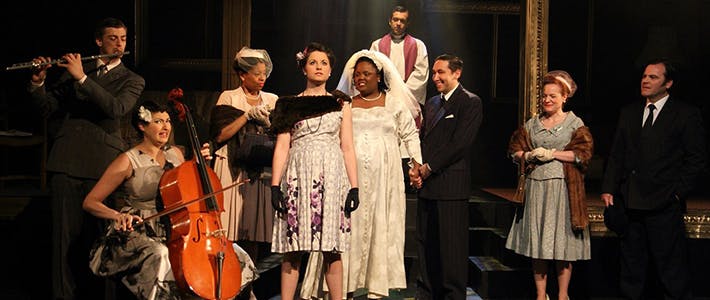Why study here?

We hope to have answered the most regularly asked questions by prospective students. If, however, you still have further queries, please do not hesitate to contact us.
Why choose Birmingham Conservatoire?
Birmingham Conservatoire (formerly Birmingham School of Acting) is a leading UK conservatoire that focuses on professional vocational training through higher education courses. This guide provides information which will help you audition, understand the training that we offer and explain methods of funding.
Past students work in all areas of the profession, and have been seen recently in EastEnders, Coronation Street, Emmerdale, The Bill, and many major TV drama series. You will see graduates working with the National Theatre, the RSC and in West End musicals. You will also find ex-students of Birmingham School of Acting appearing in regional repertory theatres, theatre in education companies and Hollywood movies.
What is your training philosophy?
We believe that acting is a creative process, not simply a craft which can be taught. Of course, there are skills and techniques that graduates will need throughout their professional lives, but of prime importance to us is the development of your creative capability.
We will not push you through an A-Z of different performance styles, but neither will we limit you by adhering to a single style of acting or teaching you acting tricks. Through exposure to a variety of material that is relevant to the needs of each cohort, we aim to help you to develop your own artistic vision. Allied to the core competencies of acting, voice and movement, this process will give you a launch pad for your individual creative expression.
You will be placed in an artistic environment where, working with creative professionals, you will be given the freedom to explore your talent and learn to express yourself. This flexibility is, we believe, what the profession is seeking in the trained actor.
Why Birmingham?
Birmingham is a great city in which to be a student. With a multicultural and diverse population, it is one of Europe's most exciting cities. It is famous for its varied nightlife and shopping, as well as its internationally-renowned music, theatre, and wide variety of cultural activities. Birmingham consistently appears as one of students' top five cities in which to study.
Do you have University Validation?
Birmingham Conservatoire is part of Birmingham City University. The University has a long history of delivering vocational higher education and this has enabled Birmingham Conservatoire to design the content and structure of its courses in a way which best suits the training of professional actors.
Why study at a Conservatoire?
Drama covers a vast range of career and work options. Birmingham Conservatoire focuses on training professional actors. However, the career paths of some graduates have led to a variety of related work – including Alex Jones, who has combined a successful career as an actor (recently in The Archers on BBC Radio 4 and Of Mice and Men at Birmingham Rep) with that of a playwright (Mickey and Me and News of the World) or Roger Redfarn, the celebrated theatre director (Plymouth, Chichester and the West End). Some graduates have set up their own theatre or media companies, become agents or casting directors, work in film or television production, but the vast majority go on to act.
Do I need to train?
There are successful actors who did not attend a conservatoire or drama school but the vast majority of working actors have received professional training.
Attending a conservatoire or drama school will help you to develop a sustainable career across the whole breadth of the profession. Training at specialist institutions like Birmingham Conservatoire not only includes the components of acting but also provides career advice and support in finding work, as well finding an agent, which can make the difference between success and failure.
Will I be rich and famous?
There has always been a concern that pursuing a career as an actor will not lead to employment, or at least not to a ‘proper job’. The truth is that not everyone can be a star and becoming an actor may not guarantee great wealth.
However, many of the school’s graduates are working professionals and enjoy long and established careers. Much of an actor’s employment is freelance, which means and there can be uncertainty about where the next contract will come from. But the desire to act, and the personal rewards of doing something that inspires you, will usually compensate for the uncertainty.
Working as an actor is not always the most financially rewarding profession; many actors, even well-known household names, undertake work that uses their skills in a range of areas such as advertising, voice-over, business and corporate training.
There is a variety of areas open to an actor such as television, radio, film, musicals, classical, repertory or experimental theatre, TIE (Theatre in Education) and some graduates go on to form their own acting or media companies. For some this has included moving into other related areas such as directing, musical directing, writing or teaching.
Do I need a qualification to be an actor?
No, but professional vocational training does make a significant difference and a higher education qualification will help you when you pursue your chosen career path.
Birmingham Conservatoire offers vocational higher education qualifications for its courses because both we and Birmingham City University recognise that the training we provide is just as rigorous as more academic courses. The intellectual understanding of our graduates, demonstrated and assessed through performance, is equal to that of students who are assessed through writing and exams.
Our courses require many more contact hours than the majority of academic degree courses or FE performing arts courses.
Birmingham City University ensures that our training meets the exacting standards of the Quality Assurance Agency, which is responsible for standards on all higher education courses.
How do I decide which course and school are for me?
The training at Birmingham Conservatoire is both professional and vocational. We want you to make an informed choice and it is in our interest that you choose the right course at the most suitable school for you.
We believe the key factors are between academic and vocational courses, as well as the professional recognition of different vocational schools and courses. Both academic and vocational courses can offer degrees, diplomas and graduate diplomas, but the difference is the amount of practical work and the focus of the course.
Academic courses offer purely theoretical or a mix of theoretical and practical work, but focus on an academic investigation that is assessed mainly through written work, while vocational courses focus on the practical application of the subject assessed in performance.
The differences are demonstrated in the amount of performance work. It is a mistake to consider that being assessed in performance is easier; Birmingham Conservatoire courses are rigorous and very intensive.
Conservatoire versus University or FE college
The professional recognition of a vocational course is important, a fact that is acknowledged by government, which provides funding for students on such courses as our BA (Hons) degree. The funding per student is significantly higher than for courses delivered by non-vocational University and FE drama or performing arts courses.
Federation of Drama Schools (FDS) 
Following the closure of Drama UK, the newly formed Federation of Drama Schools (FDS) was launched in June 2017, and Birmingham Conservatoire is one of the twenty member institutions.
Primarily established to enable prospective students to identify high quality, intensive, vocational training for performers, directors, designers and technicians, the FDS is committed to exploring ways of sharing best practice in teaching and learning; enhancing equality, accessibility and diversity in recruitment; and maintaining very strong links with various parts of the industry in which trained students will find employment.
With twenty member institutions, the FDS brings together all of the major schools that were formerly members of Drama UK.
All member schools demonstrate a commitment to the organisation’s vision and core principles, including intensive contact hours, limited class sizes and teaching by highly experienced, professionally active staff.
University, FE colleges and non-accredited drama schools do not have the same standing in the profession.
How do I get a place on a course?
All Federation of Drama Schools institutions require you to pass an audition to gain entry to an acting course. At Birmingham Conservatoire we audition all applicants who meet, or will meet, the entry requirements by 1 September in the year of enrolment.